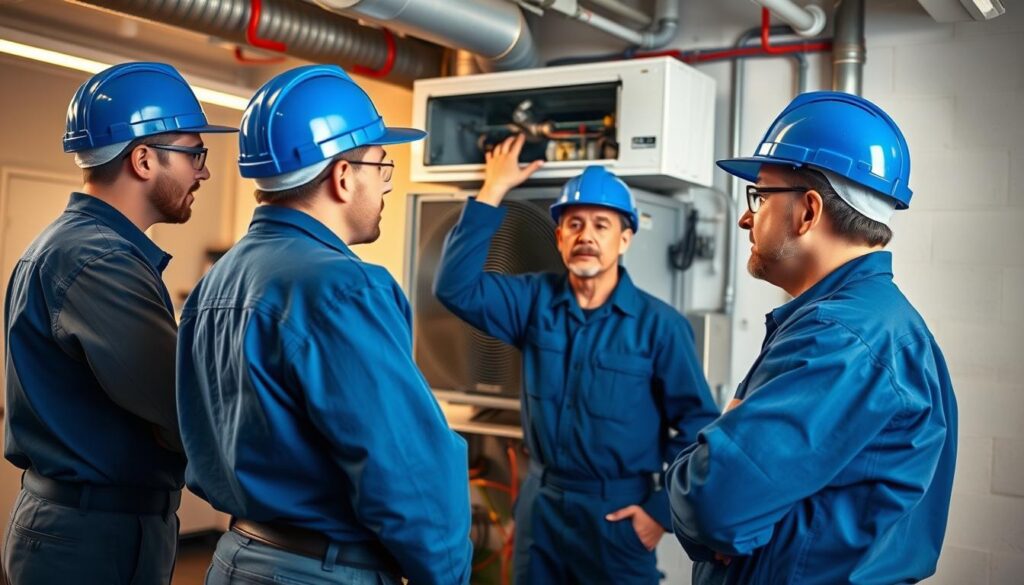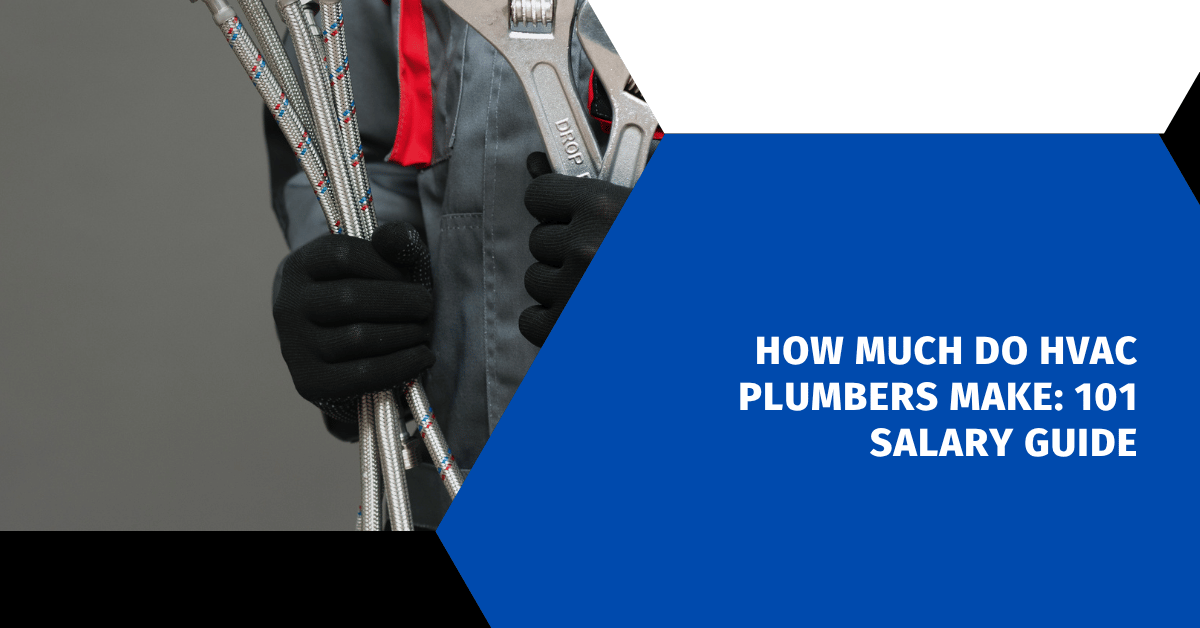Affiliate Disclosure
HVAC Guide Guys is a participant in the Amazon Services LLC Associates Program, an affiliate advertising program designed to provide a means for sites to earn advertising fees by advertising and linking to Amazon.
How Much Do HVAC Plumbers Make? Ever wondered how much HVAC plumbers earn? They keep our homes and businesses comfy. Their salaries might surprise you.

In 2024, HVAC technician salaries are looking up. The average yearly pay is $63,215, with hourly rates at $30.39. This shows a promising future for those in this field.
Several things affect how much you can earn. These include your experience, where you work, your specialty, and any certifications you have. If you’re thinking about switching careers or want to know about HVAC plumbing salaries, this guide has all the details.
Key Takeaways
- Average HVAC technician salary reaches $63,215 annually
- Hourly rates typically range from $25 to $35
- Significant earning with experience and specialization
- High demand in both homes and businesses
- Good chances for career growth and higher pay
Table of Contents
Understanding the HVAC Plumbing Industry
The HVAC plumbing industry is a key part of the American workforce. It’s always changing, thanks to new infrastructure. This means skilled workers are needed to keep places comfortable and efficient. Your career in this field could be very promising, with many ways to succeed.
This industry offers many chances for stable and fulfilling careers. Knowing how it works can help you find the right path. It also helps you understand how to make more money as an HVAC installer.
Industry Overview and Career Paths
HVAC plumbing has many career paths to choose from. Some include:
- Residential service technician
- Commercial system installer
- Industrial maintenance specialist
- Energy efficiency consultant
- HVAC system designer
Key Skills and Qualifications Required
To earn well in HVAC, you need a wide range of skills. Important ones are:
- Technical knowledge of heating and cooling systems
- Mechanical aptitude
- Problem-solving abilities
- Strong communication skills
- Physical stamina and dexterity
Job Market Trends and Growth
The Bureau of Labor Statistics says the HVAC sector will keep growing. There will be more jobs in homes, businesses, and factories.
| Career Segment | Projected Growth | Average Starting Salary |
|---|---|---|
| Residential Services | 3.5% | $45,000 |
| Commercial Installations | 4.2% | $52,000 |
| Industrial Maintenance | 5.1% | $58,000 |
Getting better at your job and getting special certifications can really boost your earnings in this field.
National Average Salary Overview
Knowing the national average salary for HVAC technicians is key if you’re thinking about a career in this field. In 2024, air conditioning technicians earn an average of $63,215 a year. This works out to about $30.39 an hour.
The HVAC industry offers good pay. Your salary can change based on a few things:
- Where you live
- How long you’ve been working
- Any special skills you have
- How much demand there is for your work
Compared to other trades, HVAC technicians get paid well. The average salary shows how important they are. They keep places comfortable and efficient for both homes and businesses.
“Your skills and expertise directly impact your earning in the HVAC industry.”
Starting salaries for air conditioning technicians are lower, but more experienced ones earn more. Getting special skills and certifications can really help your salary.
| Salary Bracket | Annual Earnings |
|---|---|
| Bottom 10% | $45,110 |
| National Average | $63,215 |
| Top 10% | $84,250 |
Understanding these salary trends can help you choose the right path in the HVAC industry.
Explore Our HVAC Shop
Looking for top-rated HVAC tools, parts, and accessories? Visit our shop and find the perfect solution for your needs.
Visit the ShopHow Much Do HVAC Plumbers Make Across Experience Levels
Your salary as a refrigeration mechanic changes with your experience. Knowing how your earnings grow helps you plan your career and set goals.
The HVAC field offers a clear path for earning more as you get better at your job. You’ll see big pay increases as you move up in your career.
Entry-Level Positions
Starting out in HVAC, you can expect to earn about $54,100 a year. Newbies get good starting pay and chances to move up fast.
- Starting salary range: $45,000 – $60,000
- Typical entry-level certifications required
- Basic technical skills development
Mid-Career Professionals
After 3-7 years, HVAC plumbers make about $65,700 on average. This shows they’ve grown in skills and knowledge.
- Advanced technical skills
- Specialized training opportunities
- Potential for leadership roles
Senior-Level Experts
Top HVAC pros with lots of experience can earn up to $77,200 a year. They solve tough problems and know the industry well.
| Experience Level | Average Annual Salary | Key Characteristics |
|---|---|---|
| Entry-Level | $54,100 | Basic certifications, learning fundamental skills |
| Mid-Career | $65,700 | Advanced technical expertise, specialization |
| Senior-Level | $77,200 | Complex problem-solving, leadership |
Your hvac career earnings can grow a lot with learning and skill improvement.
Top-Paying States for HVAC Plumbers
Exploring hvac trade income shows some states pay HVAC pros more than others. Your salary can change a lot based on where you work in the U.S.
California, Alaska, and Massachusetts are the best places for high hvac pay. These states have economic conditions that support higher salaries for HVAC techs.
“Location can be a game-changer for your HVAC career earnings,” says Michael Rodriguez, industry compensation expert.
Here are the top states for HVAC plumber salaries:
- California: Highest average salaries due to high cost of living and tech-driven economy
- Alaska: Unique geographical challenges drive premium compensation
- Massachusetts: Strong industrial and residential HVAC market
- New York: Metropolitan demand increases earning
- Washington: Growing tech sector supports robust HVAC infrastructure
What makes these states pay more? It’s because of:
- Complex industrial infrastructure
- Extreme climate conditions
- High cost of living
- Strong local economic development
Salaries vary based on local markets. This makes moving to different places a smart career move for HVAC pros.
| State | Average Annual Salary | Key Economic Factors |
|---|---|---|
| California | $85,000 | Tech industry growth |
| Alaska | $82,000 | Extreme climate needs |
| Massachusetts | $78,000 | Industrial diversity |
| New York | $75,000 | Urban infrastructure |
| Washington | $72,000 | Tech sector expansion |
Explore Our HVAC Shop
Looking for top-rated HVAC tools, parts, and accessories? Visit our shop and find the perfect solution for your needs.
Visit the ShopRegional Salary Variations and Cost of Living Impact
When looking into how much HVAC plumbers make, it’s key to understand regional pay differences. Your salary as an HVAC technician can change a lot based on where you are in the United States. Many factors play a role in how much you can earn.
The world of HVAC plumber earnings is both varied and complex. Each region has its own set of opportunities and challenges. These factors can greatly affect how much you can earn.
Urban vs Rural Pay Differences
In cities, HVAC technicians usually earn more than in rural areas. The pay gap can be quite big:
- Metropolitan regions have more complex HVAC systems
- There’s a higher demand due to more people
- Urban areas have more commercial and industrial projects
Cost of Living Adjustments
Your real earnings aren’t just about the salary. The local cost of living also matters. A higher salary in an expensive city might not go as far as a lower salary in a cheaper area.
Metropolitan Area Premium Pay
In big cities like New York, San Francisco, and Chicago, HVAC pros get paid more. These cities offer salaries 20-30% higher than the national average. This is because of the complex systems and specialized skills needed.
Location isn’t just a number—it’s a critical factor in determining your HVAC career trajectory.
Education and Certification Impact on Earnings

Getting ahead in the HVAC field is more than just basic training. Professional certifications can really boost your income. By getting specialized education, you can move up in your career and find better-paying jobs.
Some certifications that can increase your earnings include:
- EPA Section 608 Certification
- NATE (North American Technician Excellence) Certification
- HVAC Excellence Professional Level Certification
- R-410A Refrigerant Handling Certification
Each certification is a smart choice for your career growth. Technicians with advanced credentials can earn 20-30% more. The cost of these programs is from $100 to $1,500. But, the benefits over time are well worth it.
Choosing the right education can really help your career. Think about:
- Associate degree in HVAC technology
- Advanced technical training programs
- Specialized manufacturer-specific certifications
Employers look for people who keep learning. By getting more skills, you become more valuable in the HVAC field.
Explore Our HVAC Shop
Looking for top-rated HVAC tools, parts, and accessories? Visit our shop and find the perfect solution for your needs.
Visit the ShopFactors Affecting HVAC Plumber Salaries
Your salary as a heating and cooling technician isn’t just about your skills. Many important factors can affect how much you earn in the HVAC field. Knowing these can help you plan your career and increase your earnings.
Industry Specialization
Choosing a specific area in HVAC can really up your income. Some of the most profitable areas include:
- Commercial refrigeration systems
- Industrial HVAC design
- Green technology installations
- Advanced control systems
“Expertise in a niche market can differentiate you and command higher compensation.” – HVAC Industry Insider
Company Size and Type
Your job at a company can also affect your salary. Big companies and specialized contractors usually pay more than small local businesses.
- National HVAC companies: Higher base salaries
- Government agencies: Stable employment with good benefits
- Specialized contractors: Chance for bonuses based on performance
Union vs Non-Union Positions
Being part of a union can greatly change your earnings. Union jobs often offer:
- Standardized wage scales
- Better healthcare benefits
- Guaranteed overtime rates
- More job security
Tip: Look into local union opportunities to see how they can boost your salary.
Commercial vs Residential HVAC Plumbing Pay Scales
Exploring refrigeration mechanic income shows a big difference between commercial and residential HVAC plumbing. Commercial HVAC technicians usually earn more. This is because their work is more complex.
Commercial HVAC pros work with big, complex systems. They need advanced skills. This affects their earnings.
- Commercial HVAC technicians handle larger, more sophisticated systems
- Residential work involves smaller-scale installations and maintenance
- Specialized skills can increase your income in both sectors
“Expertise in commercial systems can significantly boost your earning in the HVAC industry.”
Several factors lead to salary differences:
| Sector | Average Annual Earnings | Complexity Level |
|---|---|---|
| Residential HVAC | $55,000 – $65,000 | Lower |
| Commercial HVAC | $70,000 – $85,000 | Higher |
Your career path greatly affects your income. Commercial HVAC plumbers often get more training. This leads to better pay and job opportunities.
To earn more, focus on commercial systems. Get advanced certifications and keep up with new tech.
Explore Our HVAC Shop
Looking for top-rated HVAC tools, parts, and accessories? Visit our shop and find the perfect solution for your needs.
Visit the ShopBenefits and Additional Compensation

When you think about hvac trade income, remember it’s more than just a salary. You get a full benefits package that can really improve your financial health.
HVAC professional pay isn’t just about how much you make per hour. The best companies offer great packages to keep skilled workers. These packages usually include:
- Health insurance coverage
- Dental and vision plans
- 401(k) retirement savings programs
- Paid vacation and sick leave
- Performance-based bonuses
Many HVAC companies also give extra money to help you earn more. Bonuses can be $500 to $5,000 a year. This depends on how well you do your job and how happy your customers are.
| Benefit Type | Estimated Annual Value |
|---|---|
| Health Insurance | $6,000 – $12,000 |
| Retirement Contributions | $1,500 – $4,000 |
| Performance Bonuses | $500 – $5,000 |
| Paid Time Off | $2,000 – $4,500 |
Union members get even more benefits. They might get extra training, money for equipment, and job security. So, when you invest in your HVAC career, think about all the extra value you get.
Career Advancement Opportunities and Salary Growth
HVAC plumbers have many ways to grow their careers and increase their earnings. The HVAC industry offers chances for advancement beyond the starting point. By improving your skills and aiming for higher roles, you can earn more.
Your HVAC career can change a lot as you gain more experience and knowledge. Knowing how much HVAC plumbers make at different stages can help you plan your career.
Management Positions
Getting into management is a big step up in your career. Experienced HVAC pros can move into leadership roles like:
- Operations Manager
- Service Department Supervisor
- Technical Team Lead
These jobs usually come with higher pay and better benefits. Managers can make between $75,000 to $110,000 a year, based on the company and location.
Business Ownership
Entrepreneurial HVAC plumbers can start their own businesses. This opens up the chance for unlimited earnings. Successful business owners can make six-figure annual revenues by:
- Starting a well-known HVAC service company
- Building a loyal client base
- Employing and leading skilled technicians
Specialized Technical Roles
Specialized technical jobs are another way to grow in your career. By becoming an expert in certain areas, you can earn more.
| Specialized Role | Average Salary Range |
|---|---|
| Industrial HVAC Systems Specialist | $80,000 – $95,000 |
| Commercial Refrigeration Expert | $75,000 – $90,000 |
| Energy Efficiency Consultant | $85,000 – $100,000 |
Investing in ongoing learning, certifications, and skill improvement can greatly improve your HVAC career prospects.
Explore Our HVAC Shop
Looking for top-rated HVAC tools, parts, and accessories? Visit our shop and find the perfect solution for your needs.
Visit the ShopIndustry Outlook and Future Earnings
The HVAC industry is on the verge of big changes. This brings great chances for those in hvac installer income and hvac contractor earnings. With a 4% growth from 2022 to 2032, the job market looks strong and promising.
New technologies are changing the HVAC world. Smart home tech, energy-saving systems, and green cooling options are opening up new paths. By becoming an expert in these areas, you can earn more.
- Green technology integration
- Advanced energy management systems
- IoT-enabled HVAC solutions
- Renewable energy heating and cooling
Your career can grow beyond just installing HVAC systems. Skills in commercial refrigeration, cooling data centers, and industrial climate control can increase your earnings. The industry values those who keep learning and stay current with new tech.
New markets in solar HVAC, electric vehicle charging, and smart buildings offer big chances for earnings. By keeping up with education and tech trends, you can reach your highest earning in this fast-changing field.
The future of HVAC is not just about maintaining temperature—it’s about creating intelligent, sustainable environmental solutions.
Conclusion
Your journey as an HVAC plumber can lead to great financial rewards. The pay for heating and cooling technicians varies a lot. But, by planning your career well, you can earn more.
It’s important to know how pay changes in different places. Getting special certifications and improving your skills are key to making more money.
Air conditioning technician wages show that experience is very important. Starting salaries are around $54,100, but experienced technicians can earn up to $77,200. Your career growth depends on learning, improving your skills, and making smart choices.
Investing in more training and getting industry-specific certifications can help you grow faster. Specializing in certain areas can also boost your career.
The HVAC plumbing field offers great chances for those who are ambitious. You can earn more than just a salary by moving up in your career. This includes becoming a manager, specializing in certain areas, or even starting your own business.
To succeed in HVAC plumbing, you need to be dedicated, skilled, and ready to learn new things. By focusing on your skills and planning your career, you can achieve financial success and job satisfaction.

